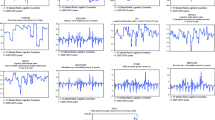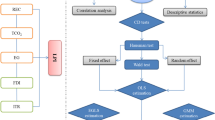Abstract
Logistics is a crucial part of every business. The logistics sector not only contributes significantly to Asian economies but also has far-reaching effects on ecological and social concerns. Therefore, it is important to examine the factors that can affect the logistics performance of the country. Hence, the primary objective of the study is to estimate the impact of CO2 emissions, ICT, and human capital on the logistics performance of the 20 Asian economies. In order to investigate the relationship between the variables, we have employed the OLS, 2SLS, GMM, and panel quantile regression. The estimates of CO2 emissions and GHG emissions are significantly negative in 2SLS and GMM methods, implying that environmental pollution hurt logistic performance. The estimates of ICT and education are positively significant, suggesting that increased use of internet and higher education rate are crucial in improving logistics performance. In the panel quantile regression model, the estimates of CO2, internet, and education are insignificant at most quantiles except at a few higher quantiles. Thus, governments should invest in the development of efficient logistics infrastructure to achieve sustainable development.
Similar content being viewed by others
Data availability
The datasets used and/or analyzed during the current study are available from the corresponding author on reasonable request.
References
Agyabeng-Mensah Y, Afum E, Acquah ISK, Dacosta E, Baah C, Ahenkorah E (2021) The role of green logistics management practices, supply chain traceability and logistics ecocentricity in sustainability performance. Int J Logist Manag 32(2):538–566
An H, Razzaq A, Nawaz A, Noman SM, Khan SAR (2021) Nexus between green logistic operations and triple bottom line: evidence from infrastructure-led Chinese outward foreign direct investment in Belt and Road host countries. Environ Sci Pollut Res 28(37):51022–51045
Anable J, Brand C, Tran M, Eyre N (2012) Modelling transport energy demand: a socio-technical approach. Energy Policy 41:125–138
Ayad H, Sari-Hassoun SE, Usman M, Ahmad P (2023) The impact of economic uncertainty, economic growth and energy consumption on environmental degradation in MENA countries: fresh insights from multiple thresholds NARDL approach. Environ Sci Pollut Res 30(1):1806–1824
Bag S, Gupta S (2020) Examining the effect of green human capital availability in adoption of reverse logistics and remanufacturing operations performance. Int J Manpow 41(7):1097–1117
Bag S, Gupta S, Luo Z (2020) Examining the role of logistics 4.0 enabled dynamic capabilities on firm performance. Int J Logist Manag 31(3):607–628
Baum CF, Schaffer ME, Stillman S (2007) Enhanced routines for instrumental variables/generalized method of moments estimation and testing. Stand Genomic Sci 7(4):465–506
Bedi JS, Dhaka P, Vijay D, Aulakh RS, Gill JPS (2020) Assessment of air quality changes in the four metropolitan cities of India during COVID-19 pandemic lockdown. Aerosol Air Qual Res 20(10):2062–2070
Caner M, Hansen BE (2004) Instrumental variable estimation of a threshold model. Economet Theor 20(5):813–843
Çelebi D (2019) The role of logistics performance in promoting trade. Maritime Economics & Logistics 21:307–323
Chen J, Rojniruttikul N, Kun LY, Ullah S (2022) Management of green economic infrastructure and environmental sustainability in one belt and road enitiative economies. Environ Sci Pollut Res 29(24):36326–36336
Dablanc L, Rakotonarivo D (2010) The impacts of logistics sprawl: how does the location of parcel transport terminals affect the energy efficiency of goods’ movements in Paris and what can we do about it? Procedia Soc Behav Sci 2(3):6087–6096
Fugate BS, Mentzer JT, Stank TP (2010) Logistics performance: efficiency, effectiveness, and differentiation. J Bus Logist 31(1):43–62
Geng R, Mansouri SA, Aktas E (2017) The relationship between green supply chain management and performance: a meta-analysis of empirical evidences in Asian emerging economies. Int J Prod Econ 183:245–258
Genovese A, Acquaye AA, Figueroa A, Koh SL (2017) Sustainable supply chain management and the transition towards a circular economy: evidence and some applications. Omega 66:344–357
Halkos G, Skouloudis A (2021) Environmental technology development and diffusion: panel data evidence from 56 countries. Environ Econ Policy Stud 23(1):79–92
Hansen BE (2000) Sample splitting and threshold estimation. Econometrica 68(3):575–603
Hassini E, Surti C, Searcy C (2012) A literature review and a case study of sustainable supply chains with a focus on metrics. Int J Prod Econ 140(1):69–82
He L, Xue M, Gu B (2020) Internet-of-things enabled supply chain planning and coordination with big data services: certain theoretic implications. J Manag Sci Eng 5(1):1–22
Herold DM, Lee KH (2017) Carbon management in the logistics and transportation sector: an overview and new research directions. Carbon Management 8(1):79–97
Hussain Y, Abbass K, Usman M, Rehan M, Asif M (2022) Exploring the mediating role of environmental strategy, green innovations, and transformational leadership: the impact of corporate social responsibility on environmental performance. Environ Sci Pollut Res 29(51):76864–76880
Thrän D, Hennig C, Rensberg N, Denysenko V, Eppler U (2015) IEA bioenergy task 40: country report Germany 2014. DBFZ
Jahanger A, Usman M, Balsalobre-Lorente D (2022) Linking institutional quality to environmental sustainability. Sustain Dev 30(6):1749–1765
Kamal M, Usman M, Jahanger A, Balsalobre-Lorente D (2021) Revisiting the role of fiscal policy, financial development, and foreign direct investment in reducing environmental pollution during globalization mode: evidence from linear and nonlinear panel data approaches. Energies 14(21):6968
Khan SAR, Dong Q, Zhang Y, Khan SS (2017) The impact of green supply chain on enterprise performance: in the perspective of China. J Adv Manuf Syst 16(03):263–273
Khan SAR, Zhang Y, Anees M, Golpîra H, Lahmar A, Qianli D (2018) Green supply chain management, economic growth and environment: a GMM based evidence. J Clean Prod 185:588–599
Khasnis AA, Nettleman MD (2005) Global warming and infectious disease. Arch Med Res 36(6):689–696
Kim C, Shin WS (2019) Does information from the higher education and R&D institutes improve the innovation efficiency of logistic firms? Asian J Shipp Logist 35(1):70–76
Koenker R, Bassett Jr G (1978) Regression quantiles. Econometrica: J Econ Soc 33–50
Liang Z, Chiu YH, Guo Q, Liang Z (2022) Low-carbon logistics efficiency: analysis on the statistical data of the logistics industry of 13 cities in Jiangsu Province, China. Res Transp Bus Manag 43:100740
Liu S, He N, Shi Y, Li G (2021) The roles logistics agglomeration and technological progress play in air pollution–new evidence in sub-regions of Chongqing, China. J Clean Prod 317:128414
Liu D, Zhang Y, Hafeez M, Ullah S (2022a) Financial inclusion and its influence on economic-environmental performance: demand and supply perspectives. Environ Sci Pollut Res 29(38):58212–58221
Liu L, Wu H, Hafeez M, Albaity MSA, Ullah S (2022) Carbon neutrality through supply chain performance: does green innovation matter in Asia? Economic Research-Ekonomska Istraživanja 1–13
lo Storto C, Evangelista P (2023) Infrastructure efficiency, logistics quality and environmental impact of land logistics systems in the EU: A DEA-based dynamic mapping. Research in Transportation Business & Management 46:100814
Magazzino C, Alola AA, Schneider N (2021) The trilemma of innovation, logistics performance, and environmental quality in 25 topmost logistics countries: a quantile regression evidence. J Clean Prod 322:129050
Mariano EB, Gobbo JA Jr, de Castro Camioto F, do NascimentoRebelatto, D. A. (2017) CO2 emissions and logistics performance: a composite index proposal. J Clean Prod 163:166–178
Martel A, Klibi W (2016) Designing value-creating supply chain networks. Springer, Cham
McMichael AJ, Friel S, Nyong A, Corvalan C (2008) Global environmental change and health: impacts, inequalities, and the health sector. BMJ 336(7637):191–194
Mostafa N, Hamdy W, Alawady H (2019) Impacts of internet of things on supply chains: a framework for warehousing. Social Sciences 8(3):84
Mubarik MS, Bontis N, Mubarik M, Mahmood T (2022) Intellectual capital and supply chain resilience. J Intellect Cap 23(3):713–738
Nadeem S, Alvi AK, Iqbal J (2018) Performance indicators of e-logistic system with mediating role of Information and Communication Technology (ICT). J App Econ Bus Res 8(4):217–228
Khuc QV, Nguyen MH, Le TT, Nguyen TL, Nguyen T, Lich HK, Vuong QH (2022) Brain drain out of the blue: pollution-induced migration in Vietnam. International Journal of Environmental Research and Public Health 19(6):3645
Organisation for Economic Co-operation and Development (OECD) Staff (2017) OECD skills outlook 2017: skills and global value chains. OECD, Paris
Pålsson H, Pettersson F, Hiselius LW (2017) Energy consumption in e-commerce versus conventional trade channels-insights into packaging, the last mile, unsold products and product returns. J Clean Prod 164:765–778
Prajogo D, Olhager J (2012) Supply chain integration and performance: the effects of long-term relationships, information technology and sharing, and logistics integration. Int J Prod Econ 135(1):514–522
Rahman M, Kamal MM, Aydin E, Haque AU (2022) Impact of industry 4.0 drivers on the performance of the service sector: comparative study of cargo logistic firms in developed and developing regions. Prod Plan Control 33(23):228–243
Saidi S, Mani V, Mefteh H, Shahbaz M, Akhtar P (2020) Dynamic linkages between transport, logistics, foreign direct Investment, and economic growth: empirical evidence from developing countries. Transportation Research Part a: Policy and Practice 141:277–293
Usman M, Balsalobre-Lorente D, Jahanger A, Ahmad P (2023) Are Mercosur economies going green or going away? An empirical investigation of the association between technological innovations, energy use, natural resources and GHG emissions. Gondwana Res 113:53–70
Wan X, Jahanger A, Usman M, Radulescu M, Balsalobre-Lorente D, Yu Y (2022) Exploring the effects of economic complexity and the transition to a clean energy pattern on ecological footprint from the Indian perspective. Front Environ Sci 9:736
Zaman K, Shamsuddin S (2017) Green logistics and national scale economic indicators: evidence from a panel of selected European countries. J Clean Prod 143:51–63
Zhao Y, Wang S (2015) The relationship between urbanization, economic growth and energy consumption in China: an econometric perspective analysis. Sustainability 7(5):5609–5627
Zhou G, Li H, Ozturk I, Ullah S (2022) Shocks in agricultural productivity and CO2 emissions: new environmental challenges for China in the green economy. Economic Research-Ekonomska Istraživanja 35(1):5790–5806
Zhu Q, Sarkis J, Lai KH (2008) Confirmation of a measurement model for green supply chain management practices implementation. International journal of production economics 111(2):261–273
Zhu Q, Sarkis J, Lai KH (2007) Green supply chain management: pressures, practices and performance within the Chinese automobile industry. J Clean Prod 15(11–12):1041–1052
Author information
Authors and Affiliations
Contributions
This idea was given by Muhammad Wasim Akram and Muhammad Hafeez. Muhammad Wasim Akram, Muhammad Hafeez, Shuchun Yang, Narayan Sethi, and Shaza Mahar analyzed the data and wrote the complete draft, while Raufhon Salahodjaev and Shaza Mahar revised and updated in terms of language. Muhammad Wasim Akram, Raufhon Salahodjaev, and Muhammad Hafeez read and approved the final version.
Corresponding author
Ethics declarations
Ethical approval
Not applicable
Consent to participate
I am free to contact any of the people involved in the research to seek further clarification and information.
Consent for publication
Not applicable
Competing interests
The authors declare no competing interests.
Additional information
Responsible Editor: Arshian Sharif
Publisher's note
Springer Nature remains neutral with regard to jurisdictional claims in published maps and institutional affiliations.
Appendix
Rights and permissions
Springer Nature or its licensor (e.g. a society or other partner) holds exclusive rights to this article under a publishing agreement with the author(s) or other rightsholder(s); author self-archiving of the accepted manuscript version of this article is solely governed by the terms of such publishing agreement and applicable law.
About this article
Cite this article
Akram, M.W., Hafeez, M., Yang, S. et al. Asian logistics industry efficiency under low carbon environment: policy implications for sustainable development. Environ Sci Pollut Res 30, 59793–59801 (2023). https://doi.org/10.1007/s11356-023-26681-3
Received:
Accepted:
Published:
Issue Date:
DOI: https://doi.org/10.1007/s11356-023-26681-3




